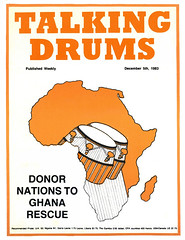Comment - Brave Men, Little Men
That should keep the caucuses of the various ideological wings of the PNDC busy for a very long time to come. Right now it is difficult to tell whether it is the IMF (and its affiliated bodies and bedfellows) that have won the PNDC over completely or the PNDC that has won the IMF over, since each cannot seem to praise the other enough.
On the PNDC side, the words must necessarily stick in the throat of the Secretary for Finance, Dr Kwesi Botchway since it is not quite a year ago when he was still denouncing the Fund and all its policies in the most uncomplimentary manner.
Indeed, the only strange aspect of the recent economic measures introduced by the PNDC and of the meeting of the donor nations having taken place at all, is that the PNDC had spent so much energy denouncing these very measures and everything that these very Western donor nations and agencies stood for. They were reviled in every official speech and the state owned press reserved the most abusive epithets for the very same things that the PNDC was parading around in Paris.
That was where the courage lay, that a group of people who had been so unanimous in their conviction that the IMF and all it stood for and Western economic ideologies were evil and unsuitable for Ghana, could turn around so effortlessly and take credit for doing the very same things. One of the reasons Fit-Lt Rawlings offered for his "timely" intervention of December 31, 1981 was that Dr Limann was on the verge of "selling" Ghana to the IMF.
The "selling" of Ghana to the Fund is not very differ ent now from what the country was rescued from, except that the terms are much harsher. What would have been a sixty percent devaluation has now meant a devaluation of more than 90 per cent (990 per cent?)
The PNDC cannot, of course, be blamed for the indecisiveness of previous regimes in Ghana who had spelt out the need for these economic measures, but had stopped short of implementing them. Even though it must be said in their defence, that it was the vociferous opposition of the very people implementing them today which always made others lose their nerves. But faint hearts never did rule a country.
It is easier for the PNDC to be brave than the hapless Dr Limann ever could be, the PNDC have got guns and these instruments tend to make those who wield them look and sound brave and those at whom they are aimed, rather mute and cowardly.
This should be the time for the PNDC Secretary for Labour Mr Ato Austin, for example, to either publicly retract his threats and effusions of the Limann period or else do the decent thing and resign from the PNDC. The problem being that if such a demand were to be implemented, there would not be many people left in the Ghana government today.
It is not simply a question of trying to dampen the PNDC's mood of celebration in questioning the motives in the big volte-face. These are measures which need the total commitment of those seeking to implement them, there can be no half measures in the desperate economic situation in Ghana. If therefore the ideological core of the PNDC remains unconvinced by the IMF and Western economic policies and these new moves prove to be merely expediencies to see the PNDC through a difficult period, then the painful measures would have been in vain, the suffering completely unnecessary.
What is even more important is for the PNDC to realise and acknowledge that the best economic measures in the world would come to naught unless there is the proper atmosphere in the country and the will of the people to make them work.
It is not enough that the PNDC Chairman routinely now condemns violence and the terrorising of civilians by soldiers.
It is not even enough that soldiers and/or PDC members are being brought before the Public Tribunal for murdering civilians. It is the sense of fear and terror induced by such acts which breed inertia in the population and no amount of fiery speeches will arouse such people to any original ideas.
Economic policies must necessarily be an integral part of the total political ideology, partly cause and party effect, economic measures must flow from the political philosophy of a country. It is an impossible task trying to graft economic measures of one particular hue onto a political ideology of another colour.
It would be easier for all citizens of Ghana to contribute their bit to the reconstruction effort, if they knew exactly what mould is being fashioned for the country. The current conflicting signals from the PNDC do not help the situation and ensure that the country does not derive the maximum benefit from the economic measures that have been introduced.
The PNDC will also have to come to terms with the reality that many Ghanaians are opposed to the political path they have chosen for the country and such people are as equally committed to their convictions and thi explains why almost two years after the PNDC seized power, the security situation in the country is still unstable.
Countries do not boom in a climate of political instability and the "strong-man-needed" theory has been shown in many Latin American countries to have turned out to be short term and illusory. The PNDC will deserve the courageous accolade if they are able to come around to the political philosophy compatible with the economic measures now being introduced. Until then, they are cowards with guns.
